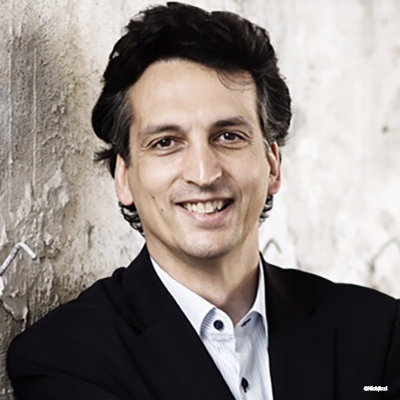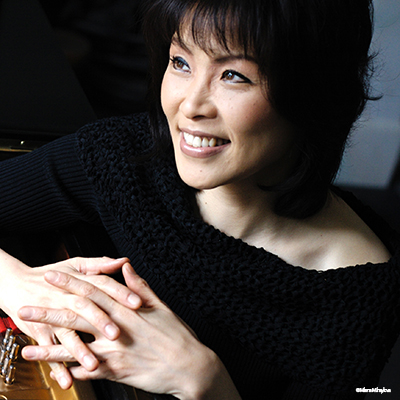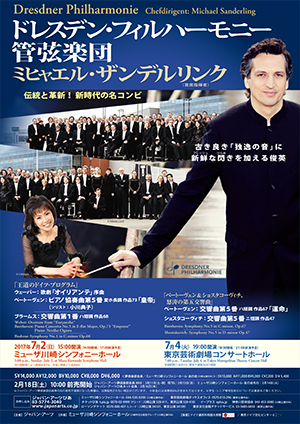Chefdirigent: Michael Sanderling Dresdner Philharmonie
- Date
- 2017/7/2(Sun) 15:00
- Date
- 2017/7/4(Tue) 19:00
Ticket InformationTicket Information
[Purchase tickets]
Tickets can be purchased either by phone or online.
Internet
Sunday, July 2, 2017, 3:00 PM Muza Kawasaki Symphony Hall
Buy Tickets Online
Tuesday, July 4, 2017, 7:00 PM Tokyo Metropolitan Theatre, Concert Hall
Buy Tickets Online
Telephone
Japan Arts Pia Call Center: 03-5774-3040
(Open 10:00 a.m. – 6:00 p.m. daily, except in the New Year holiday period)
*To order from the call center, you must be able to provide a mailing address
in Japan or pick up the tickets at a convenience store in Japan.
Please read the following link before purchasing tickets.
How to purchase tickets
Ticket Availability
Available / × None
Special discount
- ◎シニア・チケット=65歳以上の方はS席とA席が会員料金でお求めいただけます。
- ◎車椅子の方は、本人と付き添いの方1名までが割引になります。(ジャパン・アーツぴあコールセンターでのみ受付)
その他プレイガイド
- チケットぴあ t.pia.jp 0570-02-9999
[Pコード●●●-●●●] - イープラスeplus.jp
- ローソンチケット0570-000-407[Lコード●●●]
- 東京文化会館チケットサービス https://www.t-bunka.jp/tickets/ 03-5685-0650
- サントリーホールチケットセンター https://www.suntory.co.jp/suntoryhall/purchase/ 0570-55-0017
- 紀尾井ホールチケットセンター https://kioihall.jp/tickets 03-3237-0061
- 東京オペラシティチケットセンター https://www.operacity.jp/concert/ticket/ 03-5353-9999
- 横浜みなとみらいホールチケットセンター http://minatomirai.pia.jp/ 045-682-2000
チケット購入にあたっての注意事項
ProgramProgram
Sunday, July 2, 2017, 3:00 PM
Muza Kawasaki Symphony Hall
Weber: Overture from ‘ Euryanthe’
Beethoven: Piano Concerto No.5 in E-flat Major, Op.73 ‘Emperor'(Piano: Noriko Ogawa)
– – – – – – – – – – – – – – – – – – – – – – – – – – – – – – – – – – – – – – –
Brahms: Symphony No.1 in C-minor Op.68
Tuesday, July 4, 2017, 7:00 PM
Tokyo Metropolitan Theatre, Concert Hall
Beethoven: Symphony No.5 in C-minor, Op.67
– – – – – – – – – – – – – – – – – – – – – – – –
Shostakovich: Symphony No.5 in D-minor Op.47
ProfileProfile
Michael Sanderling, Principal Conductor

Born and educated in Berlin, Michael Sanderling is one of the most highly sought-after conductors of his generation. Many engagements with leading orchestras and a highly successful artistic collaboration with the renowned Dresden Philharmonic have earned Sanderling an international reputation as a conductor. Sanderling opened his tenure as Principal Conductor of the Dresden Philharmonic at the beginning of the 2011?12 season and will continue in this capacity through the 2018?2019 season. He was previously Artistic Director and Principal Conductor of the Kammerakademie Potsdam from 2006 to 2010.
Sanderling has conducted many of the world’s leading orchestras, among them Zurich’s Tonhalle Orchestra, the Yomiuri Nippon Symphony Orchestra Tokyo, the Konzerthausorchester Berlin, the Munich Philharmonic, the Staatskapelle Dresden, Bamberg Symphony, the Radio Symphony Orchestras of Stuttgart, Munich, Cologne, Hamburg, Leipzig and Hannover, the Strasbourg Philharmonic Orchestra and the Netherlands Philharmonic Orchestra. He conducted the highly praised new production of Sergei Prokofiev’s monumental War and Peace at the Cologne Opera.
In addition to several return engagements, in 2015 and 2016 he will be making his conducting debuts with the Leipzig Gewandhaus Orchestra, the Vienna Symphony, the NHK Symphony Orchestra, the Toronto Symphony Orchestra and the Tokyo Metropolitan Symphony Orchestra.
Michael Sanderling is devoted to working with talented young musicians. He was Principal Conductor of the Deutsche Streicherphilharmonie for several years and most recently has worked with Germany’s Bundesjugendorchester, the Jerusalem Weimar Youth Orchestra, the Junge Deutsche Philharmonie and the Schleswig-Holstein Festival Orchestra.
In addition to late-Romantic symphonic works, he also focuses on the works of Shostakovich and repertoire from the Classical period. As a champion of New Music, he has given many premiere performances of works by contemporary composers.
Noriko Ogawa, Piano

Since achieving her first great success at Leeds International Piano Competition, Noriko Ogawa has worked with leading orchestras and conductors, such as Dutoit, Vanska, Slatkin and Otaka. Ogawa is also renowned as a recitalist and chamber musician, performing with artists such as Evelyn Glennie. In 2001 Ogawa established a piano duo with Kathryn Stott. Ogawa regularly commissions new works and has performed premieres of works by Fujikura and Kanno.
Ogawa has been appointed Artist in Residence to Bridgewater Hall in Manchester where she will be Artistic Director for the Reflections on Debussy festival, hosted by BBC Philharmonic and Bridgewater Hall from January-June 2012.
Ogawa is an exclusive recording artist for BIS Records. Her discography includes Takemitsu Riverrun (Editor’s Choice – Gramophone Magazine) and Mussorgsky Pictures at an Exhibition (Critics’ Choice – BBC Music Magazine). Ogawa has recently concluded a complete series of Debussy recordings which has won considerable critical acclaim. She also completed recording a new Mozart disc for BIS Records in 2011.
Ogawa has received the Japanese Ministry of Education’s Art Prize in recognition of her outstanding contribution to the global cultural profile of Japan. Since 2004 Ogawa has acted as artistic advisor for the MUZA Kawasaki Symphony Hall. As a writer, Ogawa has completed her first book (published in Japan) and is currently working on a Japanese translation of Susan Tomes’s book Out of Silence – a pianist’s yearbook.
Ogawa is passionate about charity work, particularly after the earthquake and tsunami which devastated Japan in early 2011. Since the earthquake she has raised over _20,000 for the British Red Cross Japan Tsunami Fund and is keen to keep fundraising, also working with the Japan Society through 2012. Ogawa also founded Jamie’s Concerts a series for autistic children and parents.
Dresdner Philharmonie

In recent years, Michael Sanderling has become one of the most sought-after conductors of his generation. He has appeared with such renowned orchestras as Zurich’s Tonhalle-Orchestra, the Sinfonieorchester des Bayerischen Rundfunks, the Staatskapelle Dresden, the Konzerthausorchester Berlin, the Radio-Sinfonieorchester Stuttgart, the Berner Symphonieorchester, the Orchestre Philharmonique de Strasbourg, and the Nederlands Philharmonisch Orkest. He has been Principal Conductor of the Dresdner Philharmonie since the 2011/2012 season.
As the Artistic Director and Principal Conductor of the Kammerakademie Potsdam, from 2006 to 2010 Sanderling appeared at international concert venues and recorded several CDs with the ensemble, including the chamber symphonies of Dmitry Shostakovich on the SONY Classical label. In 2010 he founded “Skyline Symphony” in Frankfurt/Main ? a collaboration of Europe’s leading orchestra players who join together for special concert projects on the campus of the Goethe University to perform music in a highly approachable and informal setting.
Michael Sanderling’s early musical training was on the cello. After successfully participating as a cellist in several competitions (ARD International Music Competition Munich, Bach Competition Leipzig, Maria Canals Competition Barcelona), when only 19 ,Sanderling was engaged by Kurt Masur as principal cellist with the Leipzig Gewandhausorchester. Sanderling was later also principal cellist with the Rundfunk-Sinfonieorchester Berlin for many years. He has made guest appearances as a cello soloist with top-flight orchestras across Europe and the US, from the Sinfonieorchester des Bayerischen Rundfunks and the Orchestre de Paris to the Boston Symphony Orchestra. Michael Sanderling also actively fosters young talent both as a cello professor at the Frankfurt University of Music and Performing Arts in Hessen but also as the Artistic Director of the Deutsche Streicherphilharmonie.
2011-2012 Please do not use older versions of this biography.
In 2010 the Dresden Philharmonic marked the 140th anniversary of its founding. In a period spanning more than a century, the ensemble has worked with outstanding principal conductors and countless internationally respected soloists and guest conductors. When the orchestra’s current Principal Conductor Rafael Fr?hbeck de Burgos led the Dresden Philharmonic on a three-week tour of the United States in 2004, the New York critics celebrated the ensemble as one of the world’s elite orchestras ? a tremendous plaudit of approval for a foreign orchestra which is seldom heard in the U.S. where excellent orchestras abound and recognition of the systematic and ongoing work of the orchestra over the years.
Earliest beginnings
The founding of the Dresden Philharmonic in 1870 coincided with the official opening of the city’s first civic concert hall, the Gewerbehaus-Saal. Unlike the S?chsische Staatskapelle, which was originally the orchestra of the court and thus a performing ensemble for the aristocracy, the Dresden Philharmonic emerged from the city’s middle-class music culture. The ensemble’s roots thus date back 450 years to the first civic music ensemble, the Ratsmusik, which came into being outside the influence of the court or nobility and flourished far into the 19th century.
However, the basis for a regular presentation of concerts was initially missing, a performance hall, until in 1870 a Gewerbeverein or trades and crafts association devoted to proliferating scientific, technological and economic knowledge built a building which could serve as a venue for several types of occasions. When the Gewerbehaus-Saal was dedicated on November 29, 1870, which was used for concerts until its destruction in the Second World War, the actual history of the Dresden Philharmonic first began. At first the orchestra was referred to as the Gewerbehauskapelle. The term “philharmonic” was first used to refer to the ensemble in 1908 during a performance of “the main philharmonic concerts”. The title took on special meaning in 1909 when, as one of the first German orchestras to do so, the ensemble undertook a major tour of the United States billed as “The Dresden Philharmonic Orchestra.” The name Dresdner Philharmonisches Orchester began to be officially used starting in 1915. After performing in various temporary quarters in the years following World War II, the Dresden Philharmonic made its permanent home in the city’s downtown Cultural Palace starting in 1969.
International fame under the baton of famed conductors
The Dresden Philharmonic has worked with the most eminent conductors in each historical period since its founding. The orchestra gained worldwide fame in the 1930s, with much credit going to the leadership of Paul van Kempen. This in turn attracted the great conductors of the time to appear in concert with Philharmonic, including Arthur Nikisch, Hermann Abendroth, Hans Knappertsbusch, Fritz Busch, Erich Kleiber and Joseph Keilberth. The work of Heinz Bongartz as Principal Conductor was essential in rebuilding the orchestra in the years following World War II. Among other conductors, Kurt Masur served as Principal Conductor of the Dresden Philharmonic before later accepting an appointment to head the Gewandhaus Orchestra and ultimately serving as Music Director of the New York Philharmonic from 1991 to 2002.
Germany reunited in 1990
A new era began when a divided Germany was reunited in 1990. The artistic level of the orchestra had continued to improve despite the limiting circumstances of the GDR years – artistic excellence which allowed the orchestra to undertake many concert tours throughout the world. However, financial circumstances – the lack of a freely convertible currency – prevented artistic exchange at the international level. After German reunification entirely new opportunities presented themselves for truly cultivating the Dresden Philharmonic’s potential and systematically building on the orchestra’s strengths.
Michel Plasson – Marek Janowski
From the 1994/95 concert season the internationally acclaimed Principal Conductor Michel Plasson led the Philharmonic, a collaboration which resulted in a strong focus on key French composers on the orchestra’s concerts programs.
In 1999 Michel Plasson’s tenure came to an end. In 2001 an equally renowned conductor, Marek Janowski, became Plasson’s successor. Deeply rooted in German tradition and familiar with the performance practice of leading orchestras in all the world’s major music centers, his coming to the Philharmonic was a particularly welcome turn of events.
Rafael Fr?hbeck de Burgos
For the 2003/04 season Rafael Fr?hbeck de Burgos was named Principal Guest Conductor and a year later became Principal Conductor. His experience conducting the best orchestras in the world and his personal charisma led to a highly successful partnership with the orchestra, both concerts performed in Dresden, on tour and in the international music recording industry. Rafael Fr?hbeck de Burgos primarily presents the long-cultivated artistry of his Dresden orchestra with outstanding German symphonic repertoire which brings out the legendary “Saxon sound” upon which the orchestra’s excellent international reputation was founded. At the beginning of his tenure with the orchestra, the orchestra recorded highly acclaimed versions of Richard Strauss’s Don Juan, Till Eulenspiegel and Don Quixote. These productions were followed by a recording of Strauss’s Alpensinfonie (An Alpine Symphony) and the Rosenkavalier Suite, which also met with highest praise from record critics. Further recordings such as works by Wagner, Bruckner and Brahms as well as the orchestra’s “Encore!” release featuring famous orchestral encores round off the “Dresdner Philharmonie” edition.
Each year the Dresden Philharmonic also offers proof of its artistic abilities in numerous guest performances and concert tours. In 2004 Rafael Fr?hbeck de Burgos and the orchestra performed on tour in Spain where the newspaper “El Diario Monta?es” praised the orchestra as “one of the best German orchestras of all time.” Performances during a three-week tour of the United States also met with the highest praise: feared New York critics heralded the Dresden Philharmonic as one of the world’s finest. The orchestra’s tour of South America lasting several weeks in 2005 was also a rousing success, as were the tours throughout Switzerland (2006), the USA (2008) and Japan/Korea (2008), proving once again the excellent partnership shared by the Dresden Philharmonic and its Principal Conductor Rafael Fr?hbeck de Burgos.
Hosts
Presents by Japan Arts
Cosponsorship by MUZA KAWASAKI
Supported by Embassy of the Federal Republic of Germany Goethe-Institut


